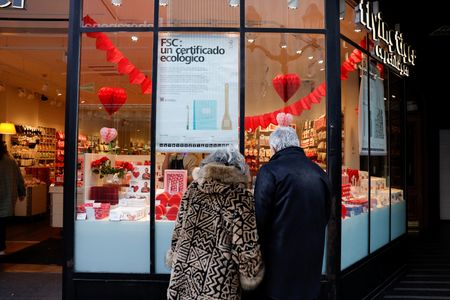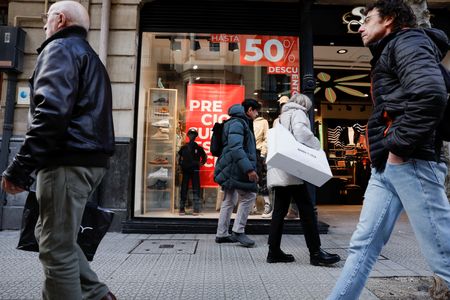MADRID (Reuters) -Spain’s consumer prices rose 5.8% year-on-year in January, the first increase in six months, according to preliminary data on Monday from the National Statistics Institute (INE), which attributed the rise to higher fuel prices.
January’s read, the most since July, compares with 5.7% over the 12 months to December.
INE said the price increases came after the government ended its blanket subsidy on all fuels, while prices of clothes and shoes did not fall as fast as during January 2022, the month when the sales season starts in Spain.
“The advance inflation figure for January is good news because it has practically stabilised, despite the elimination of some of the measures we took over the last year, in particular the fuel subsidy,” Economy Minister Nadia Calvino told reporters on Monday.
INE said it changed the methodology of calculating electricity and gas prices in January, adding in free market contracts, not tracked in the statistic until now. A similar situation has been reported in the Netherlands and Italy.
An INE official said the impact of the change in methodology was “not relevant”, in line with Funcas think tank chief economist Raymon Torres, who believes the change does not explain the negative upward surprise.
“It is bad data,” said Torres, who believes that the sharp rise in core inflation is also due to higher processed food prices.
Core inflation, which strips out volatile fresh food and energy prices, was 7.5% year-on-year, higher than 7.0% recorded in December, the INE data showed.
Calvino said the government hopes core inflation will peak in the first quarter of 2023 and that “the positive path of lower inflation” will continue throughout the year.
Spain’s European Union-harmonised 12-month inflation was 5.8%, up from 5.5% in December and above the 4.7% expectation from analysts polled by Reuters.
The headline price index had fallen fast over the second half of 2022 from a peak of 10.8% in July to 5.7% in December, the slowest in the euro area.
The Spanish data comes as the European Central Bank has all but committed to raising its key rate by half a percentage point this week to 2.5%, but policymakers are expressing different preferences for March depending on their inflation outlooks.
The euro rose slightly after the data was released.
(Reporting by Joao Manuel Mauricio in Gdansk, additional reporting by Emma Pinedo and Belén Carreño in Madrid, editing by Inti Landauro, Toby Chopra and Sharon Singleton)




